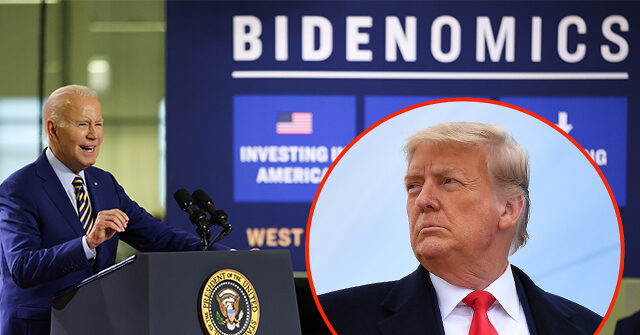
The Shaky Edifice of Improved Consumer Confidence
Americans are feeling better about the economy than they have in years. Or at least Democrats are.
Consumer confidence—as measured by the Conference Board’s monthly survey—surged to a two-year high in January, the third straight monthly increase. The assessment of current economic conditions soared to the best reading since March of 2020. The outlook for the economy six months from now saw a more modest gain to the best level in six months.
A similar poll conducted by the University of Michigan showed last week that consumer sentiment reached its best level since July of 2021, also boosted by more positive views on both current conditions and the prospects for the economy.
Gallup’s Economic Confidence Index has also been on the rise. It has been up for the past two months to its highest point in two years, the polling outfit said Tuesday.
All these measures of consumer confidence still lag where they were during the prepandemic period of Donald Trump’s presidency. They still depict an American public that is gloomier about the economy than usual by historical standards. But the trend is definitely toward improvement.
The improved confidence is a bit of a mystery. Unemployment has remained quite low for some time. Job creation has been strong but slowing. Inflation has come down from its very high levels but the latest figures show that progress has stalled out, with the month-to-month rate of price increases coming in higher in December than previous months.
To be sure, there have been some developments that have likely given a boost to consumer feelings about the economy. Mortgage rates have come down from the highs seen in October. Home prices and the stock market have been rising.
In December, the Federal Reserve appeared to signal that it was getting ready to reverse some of the interest rate hikes of the past year and a half. Retail sales were stronger than expected in December and there was a noticeable uptick in payrolls and job openings.
“January’s increase in consumer confidence likely reflected slower inflation, anticipation of lower interest rates ahead, and generally favorable employment conditions as companies continue to hoard labor,” said Dana Peterson, Chief Economist at The Conference Board.
Unfortunately, that may be a fragile edifice for stronger consumer confidence. The very sources of strength also raise the prospect of a re-ignition of inflation.
The market is rethinking how early and how often the Fed will cut interest rates this year, in large part because consumer spending and labor market data have been so strong. The futures market’s implied odds of a cut in March have fallen to around 40 percent from a near certainty weeks ago. Instead of six or seven cuts, market prices now suggest five or even just four. Diminished expectations for rate cuts could push up mortgage rates.
Democrats Are Falling In Love With The Biden Economy
What’s more, a good deal of the rise of these polls may simply be presidential politics. A closer look at the survey results suggests ferocious partisanship by Democrats underlies a good deal of the surge in consumer confidence figures.
Neither the Conference Board, nor the University of Michigan, release data on the political breakdown of their consumer surveys to the general public. The Gallup survey, however, does include a breakdown by political affiliation, so we can see that partisan politics is playing a potent role in changing sentiment around the economy.
Back in June, the Gallup survey showed that just six percent of Republicans said they rated the economy as good and one percent rated it as excellent. Thirty-two percent described the current state of the economy as “only fair” and 61 percent of it described it as “poor.”
Those figures have not improved in the most recent poll. They’ve actually become a bit worse. Two percent of Republicans said the state of the economy is excellent, six percent say it is good, 24 percent say it is only fair, and 68 percent say it is poor.
Among Democrats, however, enthusiasm for the economy has exploded. In June, 32 percent said the economy was good. Now 47 percent do. The excellent figure rose from two percent to seven percent. The share of Democrats saying the economy was only fair plunged from 43 percent to 29 percent. The share saying the economy is poor fell from 23 percent to 17 percent.
The same Democratic partisan shift can be seen in the responses to the Gallup question asking if the economy is getting better or worse. Back in June, 85 percent of Republicans said it was getting worse. In the most recent poll, that’s at 86 percent, basically unchanged.
In June, 47 percent of Democrats said the economy was getting worse. Now just 31 percent say it is getting worse.
No one has tried harder to convince the American public that the economy is doing great or to claim credit for positive developments than President Joe Biden and his minions. They even tried claiming every improvement since the pandemic was a consequence of “Bidenomics,” although that label fell so flat it has mostly been dropped.
It may be working on Democrats, however, especially as the election draws nearer. Or perhaps the loathing of the prospect of a second Trump presidency is strong enough to move Democrats to view their current circumstances more positively.
It’s hard to know exactly what is moving Democrats so strongly because the current feverish politics of the American left—as illustrated by constant yet evidence-free claims that democracy itself is at stake in the November election—bears no resemblance to anything we’ve seen in American politics since the era in which Democrats believed the election of Abraham Lincoln would spell the end of the Republic.
This post originally appeared on and written by:
Lyndia Mischke
Breitbart News 2024-01-30 23:50:00
